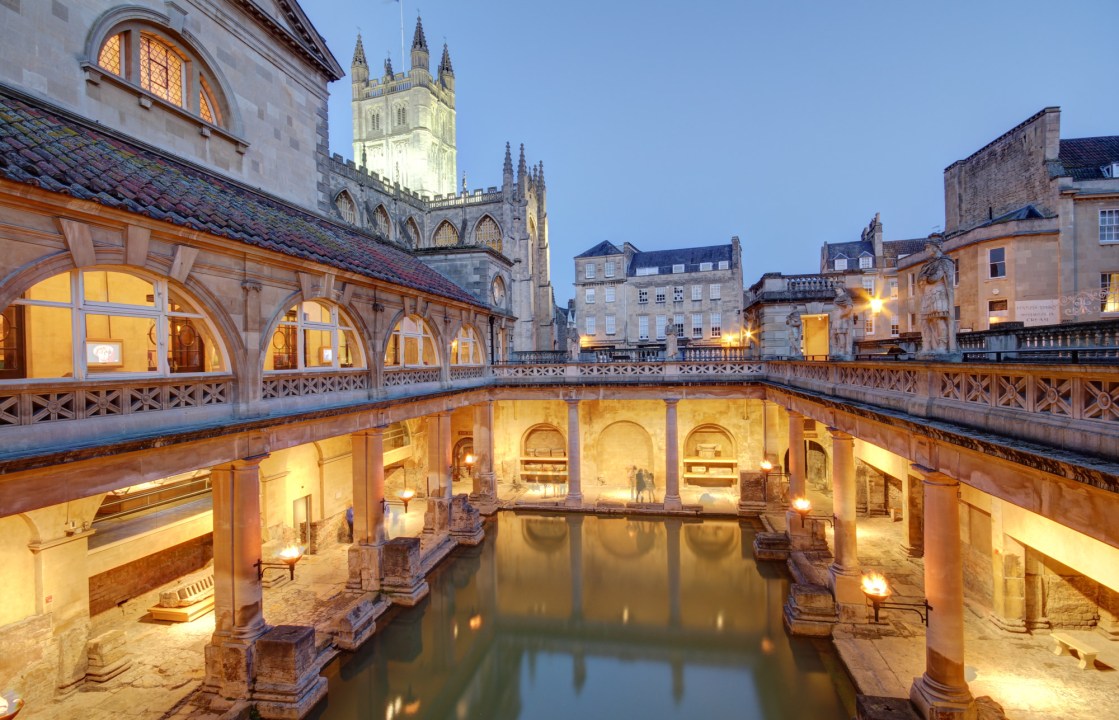Last month, the Trump administration announced that the United States would once again withdraw from Unesco, the Paris-based UN cultural agency responsible for World Heritage Sites, education initiatives, and cultural programmes worldwide. The official line? Unesco promotes ‘woke, divisive cultural and social causes’ and its ‘globalist, ideological agenda’ clashes with America First policy. Predictably, the Trump administration framed it as a culture-war grievance. But, set aside the politics, and it soon becomes clear that Trump might not be entirely wrong.
The designation treats the Georgian crescents and Roman baths as inseparable from the supermarkets, car parks, and 1970s infill
Unesco – founded in 1945 with the lofty mission of promoting peace and global cooperation through culture, education, and science – has devolved into something far less edifying.
Once led by artists, architects, and scholars, Unesco’s World Heritage Committee has become the Fifa of culture: a fiefdom of bureaucrats, political journeymen and international grifters who drift between departments, NGOs and consultancies with no accountability, while the list of sites has ballooned to 1,248. Its $1.5 billion annual budget fuels a self-perpetuating treadmill of capacity-building workshops, unread reports and relentless reputation polishing.
The consequences are not merely abstract for Bath, a Unesco World Heritage Site since 1987. Some World Heritage Sites are a single chapel, a medieval bridge, or a protected ruin; Bath’s listing covers the entire city – all 94,000 residents, its suburban sprawl, its industrial remnants, and its everyday working streets. The designation treats the Georgian crescents and Roman baths as inseparable from the supermarkets, car parks, and 1970s infill, meaning almost any change anywhere must be weighed against the city’s ‘Outstanding Universal Value.’
At the same time, the city is grappling with a record housing crisis: house prices are more than 13 times annual earnings, social housing demand is soaring, and temporary accommodation has reached a 20-year high. Homelessness services like Julian House’s Manvers Street hostel operate far beyond capacity, providing nearly 97,000 bed spaces last year alone while struggling to secure their own roof.
But Bath’s heritage status means it is almost impossible to get anything built. Although Unesco status carries no direct legal force in the UK, it is woven into planning policy through the Bath and North East Somerset Local Plan, which bars development deemed harmful to the ‘qualities justifying the inscription’ or its setting. In practice, this gives opponents of change a powerful rhetorical weapon: they need only invoke ‘Outstanding Universal Value’ to wrap their case in the prestige of an international mandate. The result is a permanent, low-level threat – that almost any proposal, however modest, might be cast as an affront to world heritage and fought on those grounds.
In 2024, residents were warned that the city’s Unesco status was ‘at risk’ after the council approved the replacement of former industrial units on Wells Road with 77 ‘co-living’ apartments. The planning committee split four to four, with the chair casting the tiebreaker vote in favour. Councillors raised concerns about the building’s bulk and potential ‘cumulative impact’ on the World Heritage Site, with one declaring the city was ‘sailing close to the wind with Unesco.’ It is extraordinary: a city struggling to house its own people, yet officials can menace its international status over a modest block of flats.
Meanwhile, residents in nearby Saltford – whose own Grade II* Saltford Manor dates to the 12th century and is thought to be Britain’s oldest continuously inhabited house – watch as Bath’s tight planning restrictions push the housing burden outwards. With 1,300 new homes proposed for its green belt, the village faces development on a scale it can’t sustain, without the infrastructure or political protection to resist it.
Phil Harding, head of the Saltford Environmental Group and a resident for more than 30 years, recently made headlines when he spoke out about the impact of Bath’s World Heritage status on neighbouring communities. ‘I’m not against new housing, I’m against putting housing in the wrong place,’ he says. Bath, he notes, is already a fantastic city that draws tourists in its own right, and Unesco status ‘makes no difference.’ The real problem, he adds, is that World Heritage designation makes it ‘incredibly hard to build in Bath,’ pushing development into nearby villages. Much of the employment for new arrivals will still be in Bath, leaving Saltford to shoulder the burden – green belt land lost, congestion rising, local services stretched – without enjoying the benefits. ‘Bath doesn’t need World Heritage Status,’ he concludes. ‘It distorts planning priorities, forcing the city to preserve appearances while shifting the real costs onto neighbouring communities.’
It may sound unthinkable, but losing that status is hardly fatal. Liverpool provides the example: once celebrated for its maritime mercantile cityscape, it was stripped of Unesco recognition in 2021 after the agency judged that recent and planned developments had caused an ‘irreversible loss’ of the site’s Outstanding Universal Value. Among the contested projects was Everton FC’s new stadium at Bramley-Moore Dock, which required filling in part of the historic dock to accommodate a 52,000-seat arena. Even the Guardian acknowledged it as ‘the most striking, ambitious addition to the waterfront since the Three Graces were built in the early 1900s.’ The £800 million stadium formed part of a broader £1.3 billion regeneration plan, projected to create over 15,000 jobs and attract more than 1.4 million visitors annually. The city did not crumble: regeneration pressed ahead, docks were revitalised, neighbourhoods transformed and tourism continued to flourish. The lesson is plain – Unesco’s imprimatur is not the secret ingredient of urban vitality, and its objections can just as easily hinder development as they can protect it.
If Unesco were merely symbolic, that would be one thing. But the status is far from meaningless: it exerts moral and political pressure, informs planning guidance, and lends weight to the opinions of advisory bodies like Historic England. For Bath, this translates into a city where development proposals are scrutinised through the lens of ‘Outstanding Universal Value,’ with councillors warned that new flats or infrastructure might unsettle international sensibilities. The result is a city frozen in amber, preserved more for the approval of tourists rather than for the people who actually live and work there.
So when the America First brigade lashes out at Unesco, it is tempting to roll our eyes. But there is a logic to that disdain. World Heritage labels are increasingly badges for the international jet set, not the local people. The US may be leaving for its own vanity, but the reasoning – that Unesco is corrupt, politicised, and more interested in theatre than preservation – hits the mark. For cities like Bath, the real question isn’t whether Unesco might disapprove, but why on earth they should care.








Comments